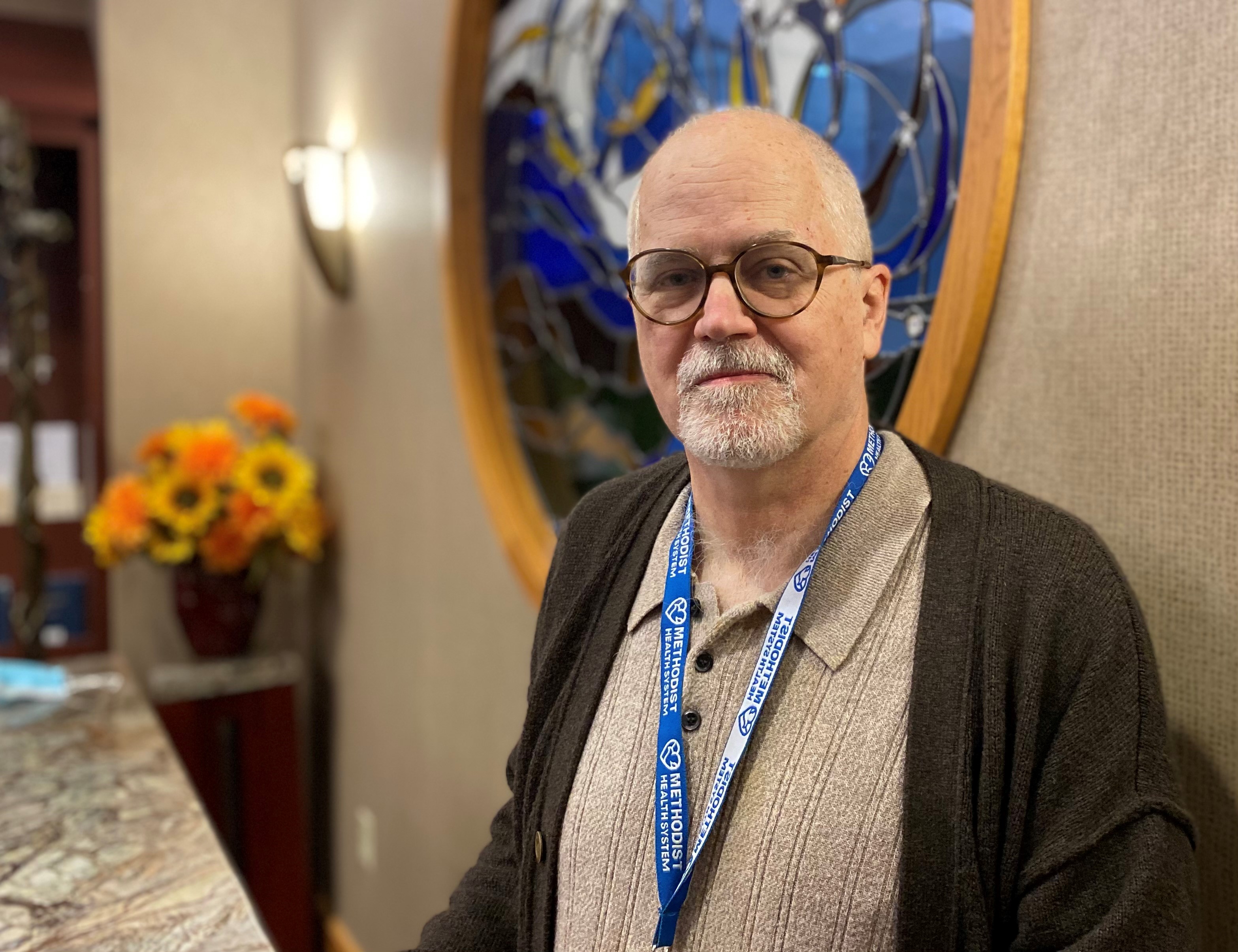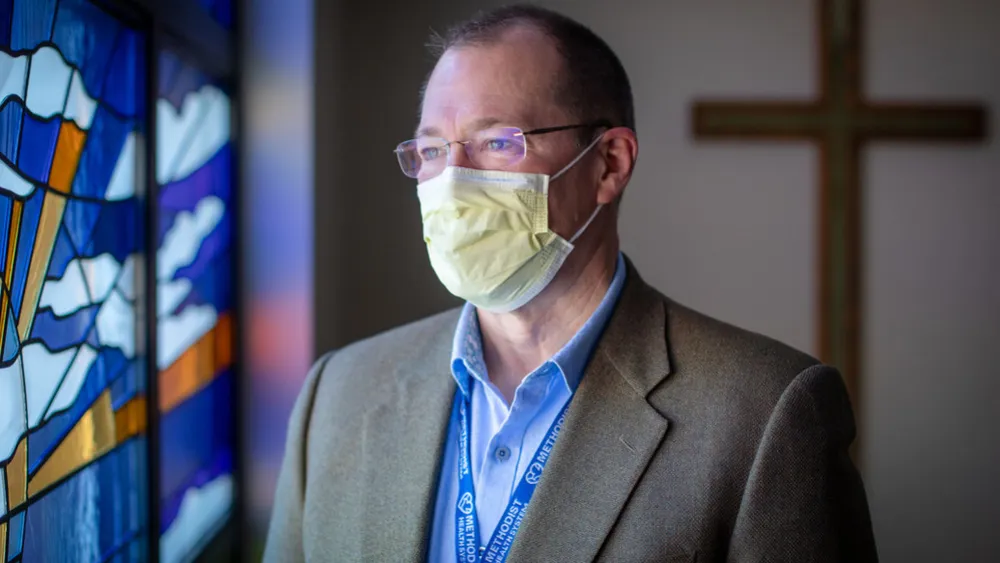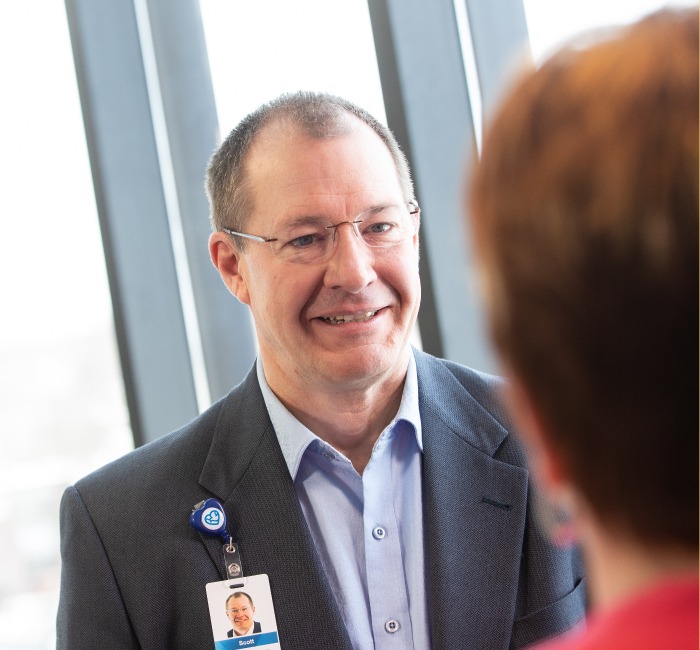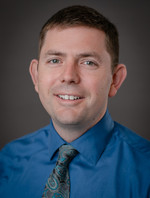





Inspiring Stories
Unsung Heroes of COVID-19: Methodist Chaplains Support Patients, Hospital Staff Through Ups and Downs
Published: Feb. 28, 2022

Methodist Fremont Health chaplain Scott Jensen

Methodist Hospital chaplain Mike McMahon will never forget his first visit with a COVID-19 patient in the spring of 2020.
Methodist Health System was still adjusting to the worldwide crisis, and uncertainty was everywhere – in how to treat COVID-19, how exactly it was spread and how long the pandemic might last.
“There was a moment when I thought I could really die from this,” said McMahon, who is in his mid-60s and diabetic. “This was while New York was having so much death, and it was so overwhelming.”
As McMahon prepared to visit the elderly patient, he felt torn between duty and safety.
“I remember gowning up, and at that time I was thinking that COVID was all around the room. Maybe it was, lingering in different places,” he said.
Covered in personal protective equipment, McMahon entered the room and saw the patient seated in the corner of the room. She looked sad and tired, he said, and he knew the only human contact she’d had recently was from other hospital staff members. He doesn’t recall exactly what they talked about, but “I’ll always remember that first visit,” he said.
“The loneliness of it. You just felt sad for her. We were just trying to make real contact, to have some human sense of caring.”

“A Listening Presence”
Methodist’s Spiritual Care Services staff includes four chaplains at Methodist Hospital, one at Methodist Women’s Hospital and one at Methodist Fremont Health. Volunteer chaplains are also on duty at Methodist Jennie Edmundson Hospital. Their past two years have been filled with countless memorable moments – many painful, but some joyful. They’ve held iPads as families said goodbye to loved ones, been with patients for their last breaths, celebrated as others recovered, and shared laughter and tears with hospital staff members.
The chaplains are among the unsung heroes of the COVID-19 pandemic – health care workers making a difference, often behind the scenes. And they have unique perspective on the battles waged daily in the hospitals.
“The amount of death that we have experienced in our community and our hospital has been pretty significant and sobering,” said Scott Jensen, the chaplain at Methodist Fremont Health. “But pain and suffering afford us an opportunity to grow if we choose to.”
While the chaplains all have Christian backgrounds, they’re keenly aware of the spiritual diversity of patients and their coworkers.
“With people in the hospital, there’s all different kinds of spirituality,” McMahon said. “Not just Catholic or Christian, but people who are atheist, people who are 12 Step, people who are Wiccan or people who don’t know what they are but still have a spiritual nature. The chaplain’s job is to support people where they’re at. And I love that.”
Many patients and families request a chaplain’s presence, but others may not be aware of the service or initially interested. The chaplains still try to make a connection. McMahon said the first few moments after introducing himself can be critical to establishing a relationship, so he tries to make others as comfortable as possible. It’s not uncommon, he said, for a patient to decline his visit but later request that he return.
“The main art of chaplaincy is being a listening presence,” he said. “If they feel like they can trust you and can share, and you’re not going to judge them, it’s such a relief for them to talk to that kind of person. It can be healing to talk about those painful things and have that person really listen.”
Before COVID-19, the chaplains always visited patients and families in the ICU, but the pandemic brought new challenges. There have been many more painful, sometimes lonely final moments. And even simple communication has proven difficult in noisy rooms with critically ill patients.
“It’s really hard to get that kind of intimate connection,” McMahon said. “Maybe the patient wasn’t conscious or was intubated. And then you have all this equipment on, and you just feel like you’re miles away from the patient.”

“Doing Life Together”
The chaplains’ duties also include supporting their coworkers. It’s a vital role that can make up half of their work, said Melissa Strong, service leader for Spiritual Care Services at Methodist Hospital. And it’s never been more important than in the wake of COVID-19.
“We all carry stories that have deeply marked our souls,” said Methodist Hospital chaplain Sandra Powers. “A tender experience I carry is a very young nurse who came out of a patient’s room. Her eyes penetrated my heart as they filled with tears. She leaned into my arms, allowing me to hold her as she whispered, ‘I don’t know if I can do this anymore.’ Time stood still until her patient called out. We release our embrace, and she wiped her tears as she went back in the room. I walked to the breezeway, cried and prayed.”
Jensen shared a memory of recently being with two nursing students in two occasions when patients died.
“I simultaneously encouraged them that their tears were beautiful, appropriate, good and helpful for themselves and the families they were caring for,” he said. “Even in the deepest, darkest moments, we try to find the sweetness in the bitter. Trying to figure out what’s good here today. And there always is. There’s always something good.”
Being there for coworkers, no matter the situation, is what Jensen treasures about his work. He affectionately calls it “doing life together.”
“It’s when I’m one of the first people a coworker tells that they’re pregnant, or they ask for a prayer to become pregnant,” he said. “It’s the coworker whose loved one dies, and they ask me to have the incredible privilege of doing the funeral. It’s the coworkers who ask you to perform their weddings or baptize their children. The ones who trust you enough that they can tell you about very difficult things that they’re going through. You get to do life with them. You have the privilege of being there in the worst of moments, but also you have the incredible thrill of being there in the greatest moments of joy.”
Driven To Help Others
Despite the challenges and difficulties the past two years have brought, Methodist’s chaplains remain driven by a sense of purpose.
“I’ve had mornings where I came in and I was just so tired. I just felt like I didn’t have much energy, McMahon said. “But I’d go up and someone would share with me and was real with me, and I’d be energized. I always feel very lucky and graced to be able to do this job and be in that room with people in those moments – to be a small help to them and the staff.”
Said Powers: “Knowing my calling is from God, I am humbled and blessed to provide spiritual support to our countless patients, their families and caregivers. It’s a profound privilege to enter the lives of others as an intimate stranger in the midst of their suffering and hold them tenderly, honor their religious practices, compassionately listen to their stories and wipe their tears.”
Jensen added: “I am absolutely and most wonderfully blessed. I feel like the luckiest guy in the world to be able to do this, and by God’s grace and his help, to hopefully make a small difference in people’s lives. For so many of us in this profession, working in a hospital setting, that’s the absolute thrill and delight – to have a sense that you truly had an opportunity to make a little bit of a difference for good.”
More Resources
- Learn more about Spiritual Care Services at Methodist.
- Read similar articles about Methodist’s Unsung Heroes of COVID-19.
- Read more articles in our COVID-19 section.


